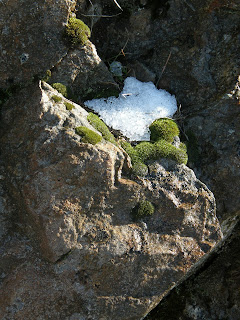A hero is a man who does what he can.
--Romain Rolland
I awoke this morning to wind roaring over the ridge and the wind chime’s mad clanging. Snow is plastered on the eastern windows and icy air is seeping in through every available crack. A dawn is out there, somewhere, but it’s a dark one, on this mountain.
Mornings like this always regress me to my childhood, when my folks were pioneering on this mountain. There was plenty about that experience that was pretty bleak, especially on mornings like this. And that’s just from a child’s perspective. I try to imagine my folks getting up in the icy dawn to start the fire and cook breakfast and get my sister and me ready for school, often without benefit of power, which was an iffy proposition in those days and just as prone to be off as on.
I loved to huddle on mornings like this, listening to the wind, drowsing and dreaming under my mother’s homemade quilts. There was no internet in those days on which to speed orders to The Company Store for goose down comforters. No, one placed an order to Monkey Ward, as my father called it, or Sears, on the yellow order form in the middle of the catalogue, for cotton batting. Once that had arrived at the post office, it was layered between any old blankets too frayed for individual use, a pretty polished cotton print was added front and back, and the whole works was sewn together at the edges. Finally, 4-ply wool yarn was threaded into a needle with a giant eye and passed through all layers, at intervals, and knotted off. Et voila! A quilt was born. It was heavy as cement, but warm. I would lie beneath a collection of these like a flower pressed between the pages of a book, enjoying those last moments before exposure to the frigid air.
What woke me this morning was the sound of my husband’s truck, muffled by the snow on the road, as he went off to work at the local Waldorf school. On miserable days when the weather is doing its best to be bad, he always leaves early, to check ceilings and windows for leaks, to salt the paths and then, no matter what the dispensation of weather, to stand in the parking lot as parents zip in and eject their children like plants dispersing seeds, and then zip off again, already late for work. David is the self-appointed traffic director and has made it his mission to see that every single child makes it to class safely, despite the darting cars.
Some days he comes home with his cheeks reddened from cold and wind, his hair tousled and his clothes soaked. He doesn’t have to do this but it is innate in him to do what he can to keep the world running smoothly. I think of my father, too, who, during a blizzard, once shoveled his way all the way up this mountain, in the days before this road was plowed. He arrived home near midnight, frozen to the bone, his clothing stiff with ice. He didn’t have to do it. But we had no phone in those days, and he didn’t want my mother to worry.
I have always seen these small acts of selflessness on the part of every-day men and women as a kind of heroism. These acts are given so simply, without expectation of thanks, with the welfare of others uppermost in mind and heart, that it’s easy to forget what they cost the doer. So I was delighted when I encountered the above quote, as it expresses the admiration I feel for humble acts of selflessness. I would only amend it by adding women, making it read A hero is a woman or man who does what s/he can.
This extends even beyond the human world -- for instance, to the chimpanzee whose photo is currently making the email rounds, seated with her toes sweetly entwined, in the act of bottle-feeding a tiger cub. Or the mother elephant who risks her life to rescue her baby from a cliff. Love is the glue of the world. Once any one of us has surrendered to it, selfless acts flow from us and we each wear the energetic laurel wreath of the hero.
Happy Leap Year, my friends, and thank you for leaping in when needed.
Signs of Life:
I don't know about you, but I have never heard about this amazing boatlift, during 9/11. It's very moving and well worth 12 minutes of your time, to see what ordinary citizens can do under extraordinary circumstances.
"http://www.youtube.com/embed/MDOrzF7B2Kg?rel=0"



























